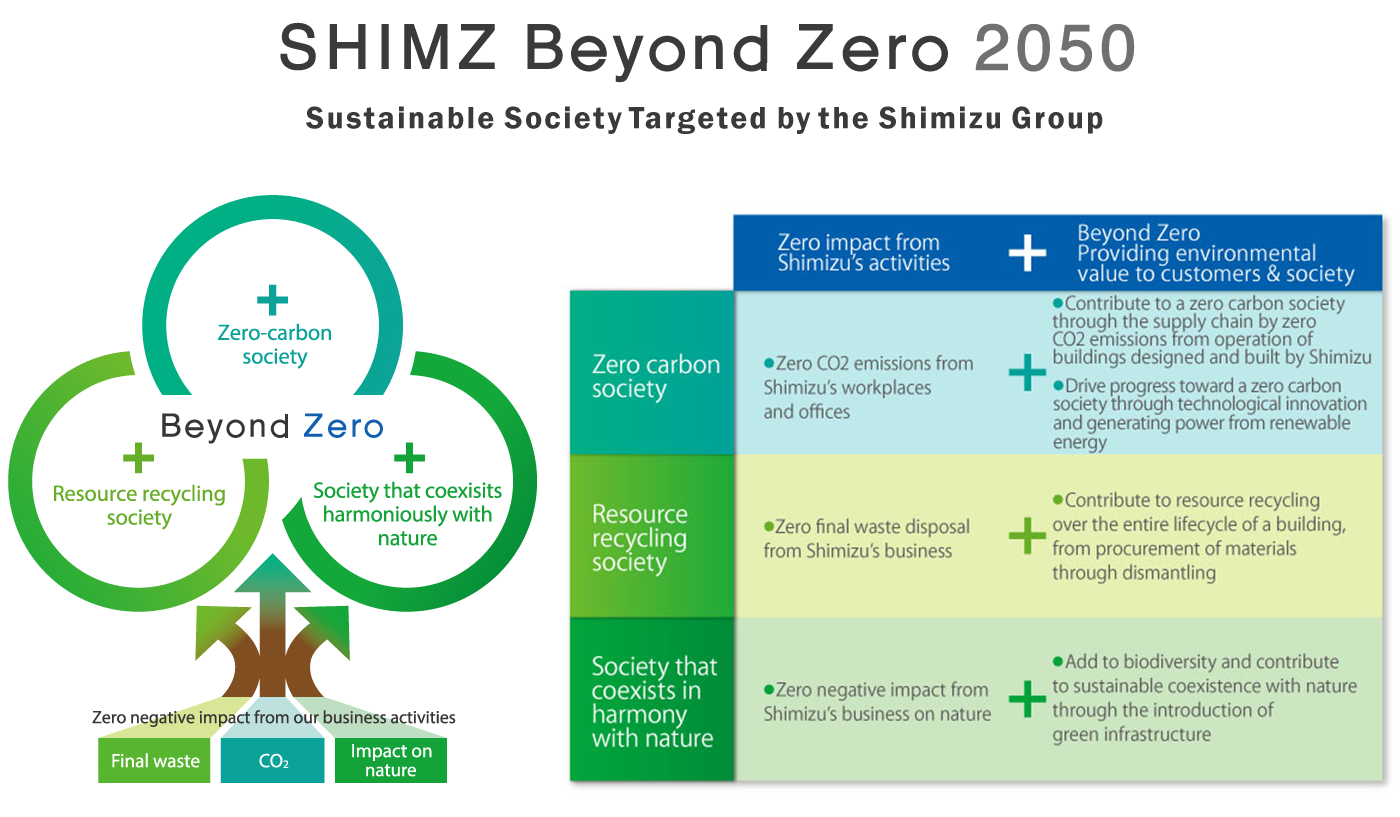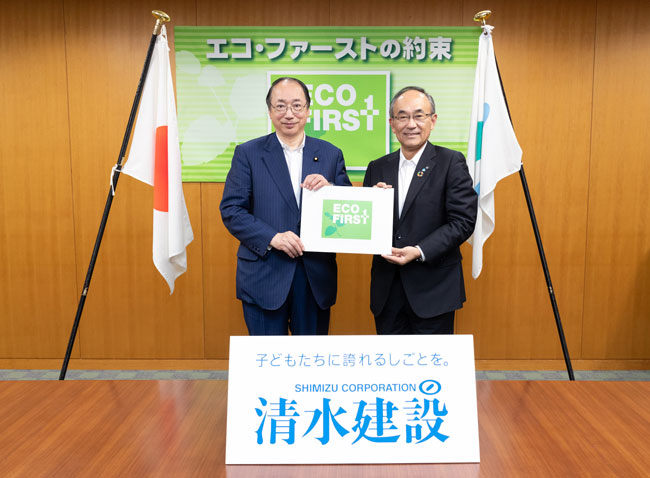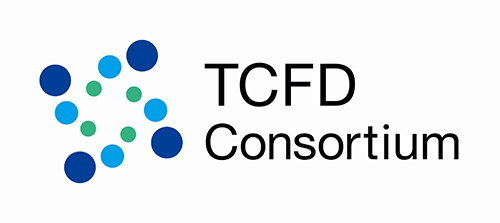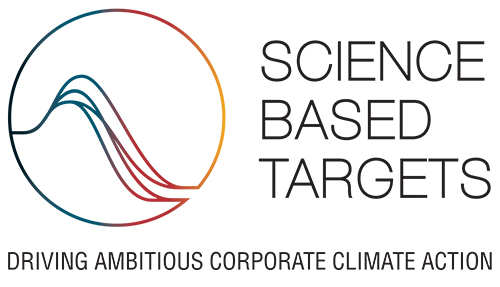Aiming to be a Company that Helps to Build Sustainable Communities
We put into practice environmentally friendly business activities and the creation and restoration of the environment at all stages of our business activities to embody our contribution to the global society. We do that based on the Shimizu Global Environmental Charter we formulated in 1991 and the Basic Environmental Policy we formulated in 1997 (revised in 2019). Moreover, we are promoting environmental management to realize a sustainable society which takes into consideration the global environment as we have stated in our long-term vision called SHIMZ VISION 2030 and to achieve the SHIMZ Beyond Zero 2050 environmental vision for our group.
SHIMZ Beyond Zero 2050
The Shimizu Group has formulated our environmental vision under the title of SHIMZ Beyond Zero 2050. We have defined the sustainable society we are aiming for in that vision as a zero-carbon society, a resource recycling society and symbiotic society. We have stated that we are aiming to proactively provide positive environmental value to our customers and society in addition to eliminating the negative impact from our activities by 2050 (Beyond Zero).

Basic Environmental Policy
We established the Basic Environmental Policy in April 1997. We are promoting environmental management across the company based on that policy. We have since revised the policy in April 2003, April 2004, April 2006 and May 2019 into its current form.
The Kyoto Protocol to the United Nations Framework Convention on Climate Change (UNFCCC) was adopted at the Conference of Parties in 1997, and the Japan Business Federation published the Voluntary Action Plan on the Environment.
2019 Basic Environmental Policy (PDF: 92KB) (only in Japanese.)
Basic Position Statement
Shimizu and its group companies engage in environmentally friendly business activities and creation and restoration of the environment at each stage of sales, R & D, design, procurement, construction, renovation, and dismantling of all business activities. We contribute to value creation for our customers and sustainable development of society.
Guidelines on Conduct
- Shimizu sets and works on the following related goals that will contribute to the achievement of the SDGs.
- Mitigating Global Warming (Ecological Mission)
- Resource Conservation and Resource Recycling
- Biodiversity Preservation
- Shimizu implements the following measures that will contribute to the achievement of our goals.
- Energy saving and conversion to renewable energy in life cycle of buildings
- Reduction of waste such as waste plastic and promotion of effective use
- Promotion of activities for biodiversity preservation and indexing
- Technology research and development that contributes to solving environmental issues and strengthening business competitiveness
- Shimizu complies with environmental laws and regulations through continuous improvement and utilization of our environmental management system.
- Shimizu contributes to value creation and social development through communication inside and outside the business, such as promoting the adoption of environmental technology through dialogue with customers, environmental volunteers and support activities.
- Shimizu strives to raise environmental awareness and acquire knowledge through environmental education.
- Recognizing this policy, Shimizu Group aim to minimize environmental-related business risks such as climate change and maximize opportunities.
Eco-First commitment
We acquired Eco-First Program certification in 2018. This is a program in which companies make a commitment to the Minister of the Environment to work to conserve the environment. Our Eco-First commitment is based on our targets for FY2030 such as measures against global warming, the effective use of resources and biodiversity efforts.

ISO 14001 Certification
In 1998, Engineering Headquarters acquired certification. In 1999, Shimizu acquired certification for all divisions and branches, except for overseas branches.
As of January 2023, offices that acquired ISO 14001 certification encompass roughly 91% of all Shimizu employees and directors.
List of offices that acquired ISO 14001 certification
| ISO 14001 certification of the acquired business sites | Percentage of business establishments that have obtained certification |
|---|---|
Domestic
|
88%* |
Overseas
|
Calculated based on the percentage of employees that work in the certified offices (this is due to the fact that certifications were obtained mainly for our large offices, and therefore the percentage of certified business sites does not provide an accurate picture of our certification ratio).
Of the international division, departments based in Japan are counted as domestic. Overseas establishments individually acquired certification according to the situation in each country.
External Coordination Related to the Environment and Climate Change
Activities with external organizations
Japan Federation of Construction Contractors (JFCC)
We participate in climate change committees and subcommittees of JFCC, an organization representing the construction industry, planning and implementing measures for the industry with other companies. Our employees participate in the Environmental Management Subcommittee, the Global Warming Prevention Subcommittee, the Biodiversity Subcommittee, and the Construction Byproducts Subcommittee within the Environmental Committee.
Japan Federation of Construction Contractors (JFCC)
Japan Business Federation (Keidanren)
This is an organization of member companies that conducts various activities related to conservation. We participate in its activities as a permanent member, and an executive officer from Shimizu serves as vice chairman.
Keidanren Committee on Nature Conservation (KCNC)
Global Compact Network Japan (GCNJ)
We participate in the Environmental Management Subcommittee, ESG Subcommittee, and Circular Economy Subcommittee, engaging in lively discussions with participating companies and applying the results to our own initiatives.
We also participate in the Eco-First Promotion Council as an Eco-First-certified company and actively participate in biodiversity-related organizations. We ensure that our position is consistent with the organizations we participate.
Participation in initiatives
| Organization | Description of Activities | Logo |
|---|---|---|
| Task Force on Climate-related Financial Disclosures (TCFD) Consortium | We consider the impact of climate change on our business as an important management issue and believe it is essential to disclose relevant information from the perspective of ESG management. In addition to declaring our support for the TCFD recommendations, we participate in the TCFD Consortium to disclose climate-related information in accordance with the recommendations. |  |
| Science Based Targets initiative (SBTi) | As part of our efforts to realize a zero-carbon society, we have established medium- and long-term reduction targets based on SBT※, using total CO2 emissions as an indicator to assess and manage the impact of climate-related issues on our business. |  |
| Taskforce on Nature-related Financial Disclosures (TNFD) Forum | The TNFD is an initiative that aims to restore biodiversity by creating a framework to encourage companies to disclose information on risks and opportunities related to nature and biodiversity and reversing flows of funds that cause loss of natural capital. In addition to endorsing this philosophy, we will promote the appropriate disclosure of information on natural capital by participating in the TNFD Forum, a stakeholder organization that supports the development of an information disclosure framework. |  |
SBT:Science Based Targets
Science-based greenhouse gas emission reduction targets established to limit the increase in global average temperature to below 2°C (and preferably to 1.5°C)




